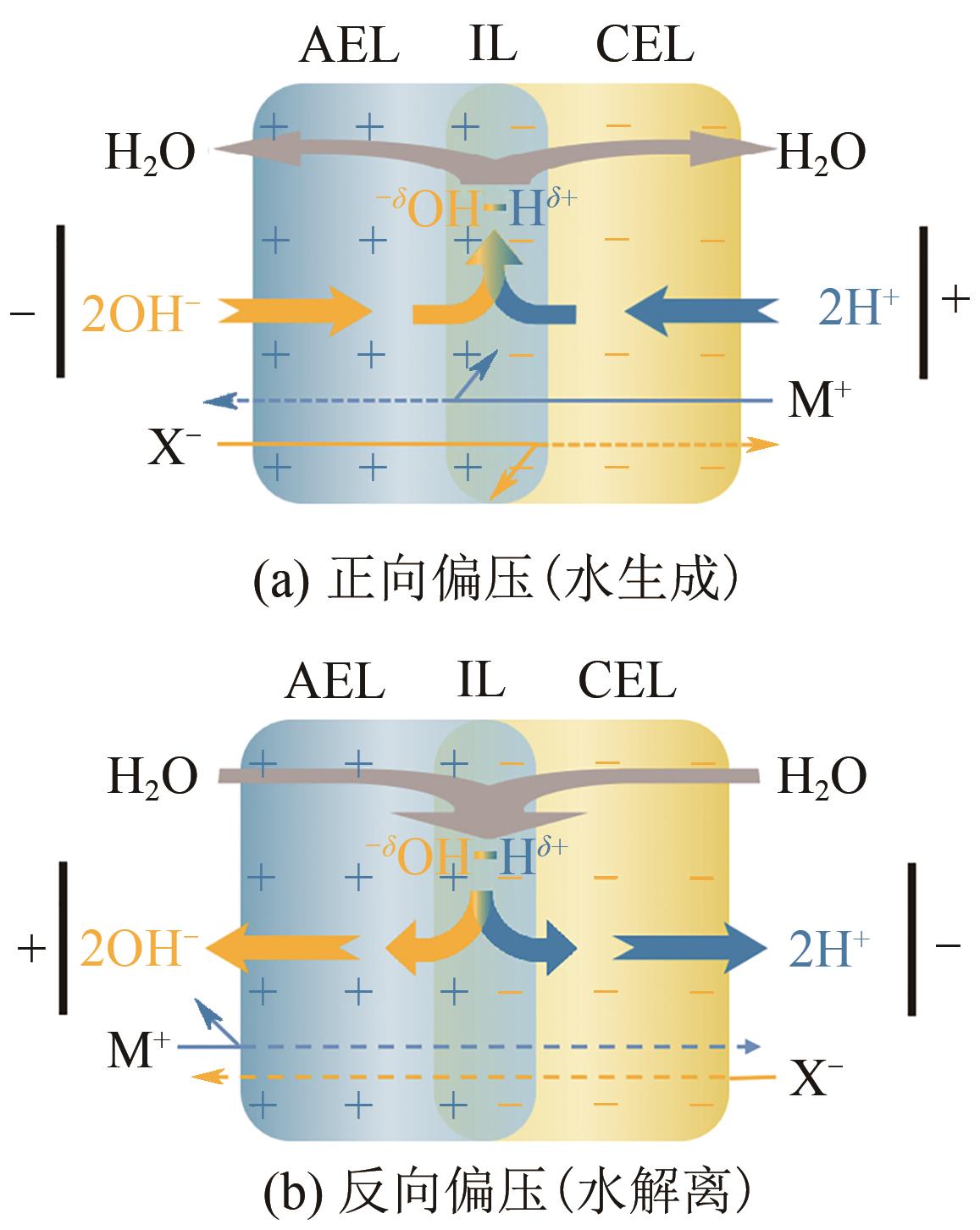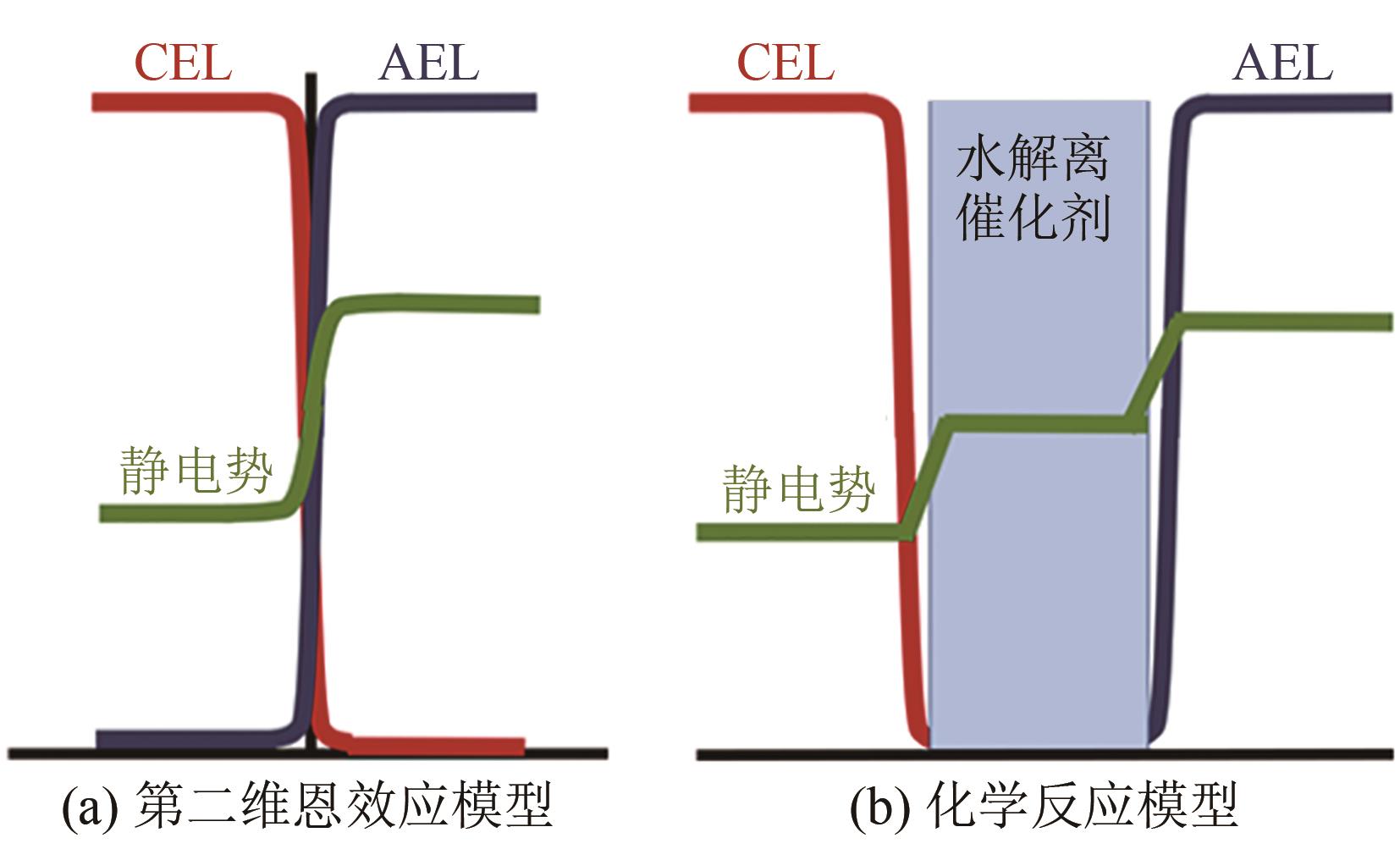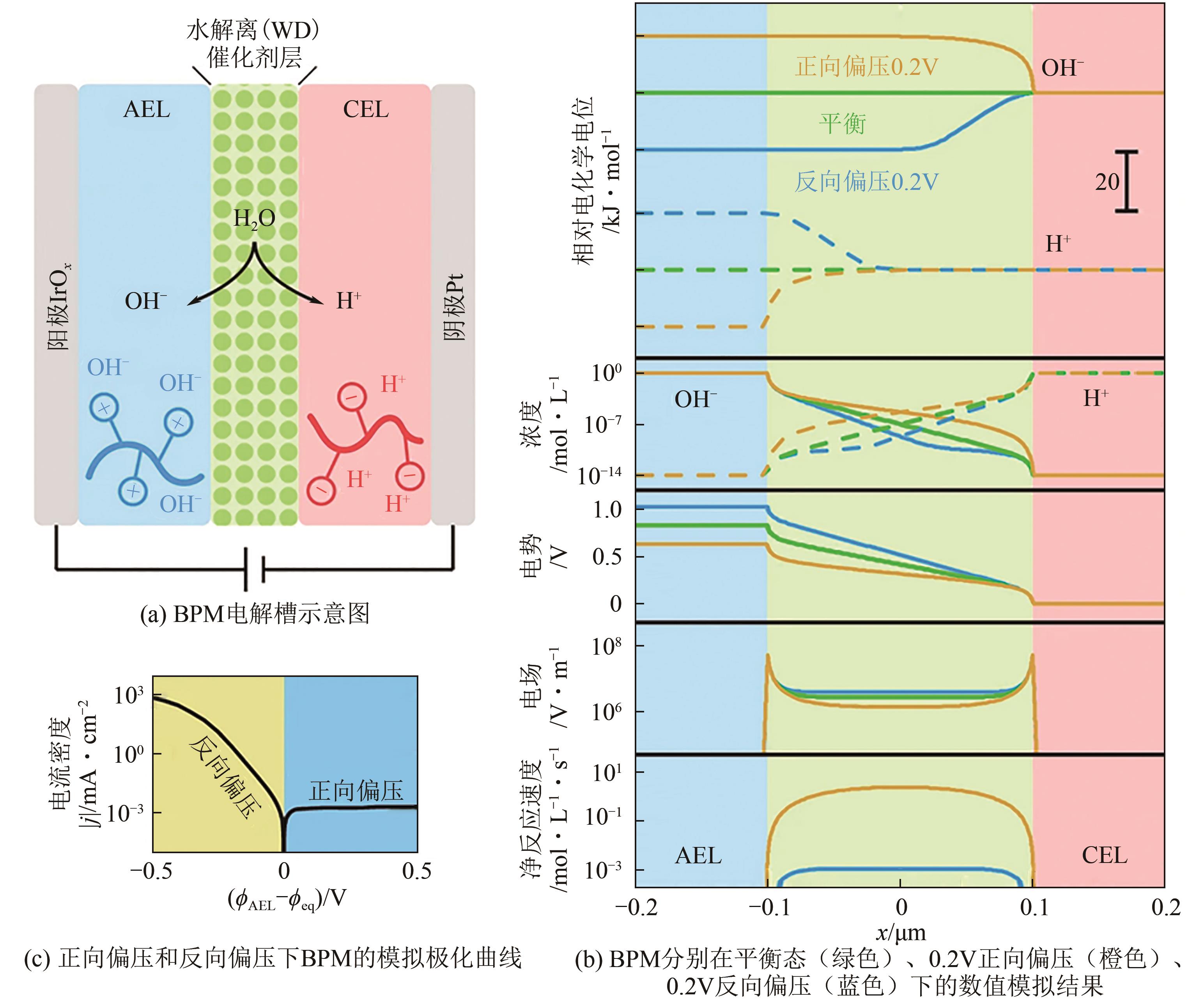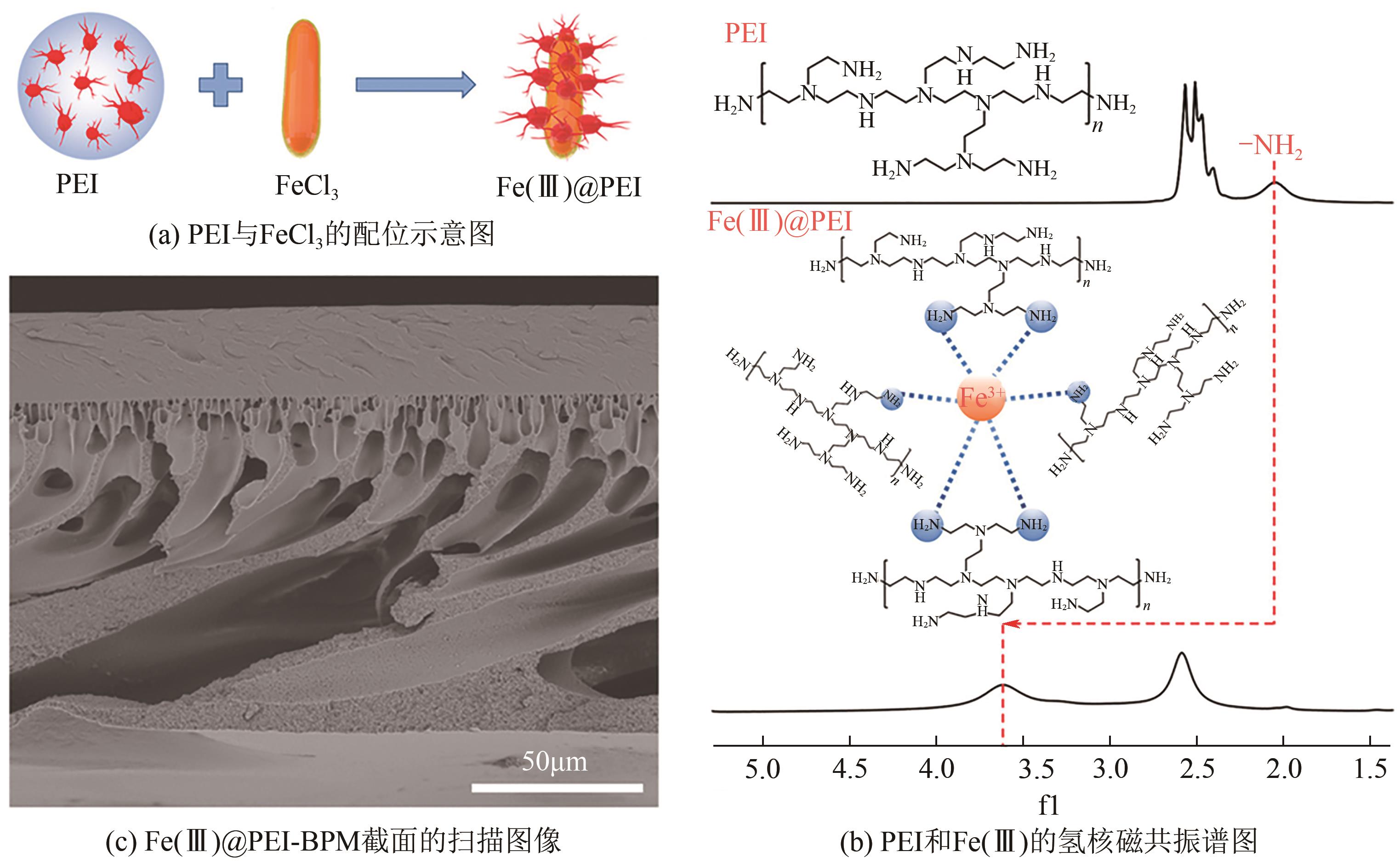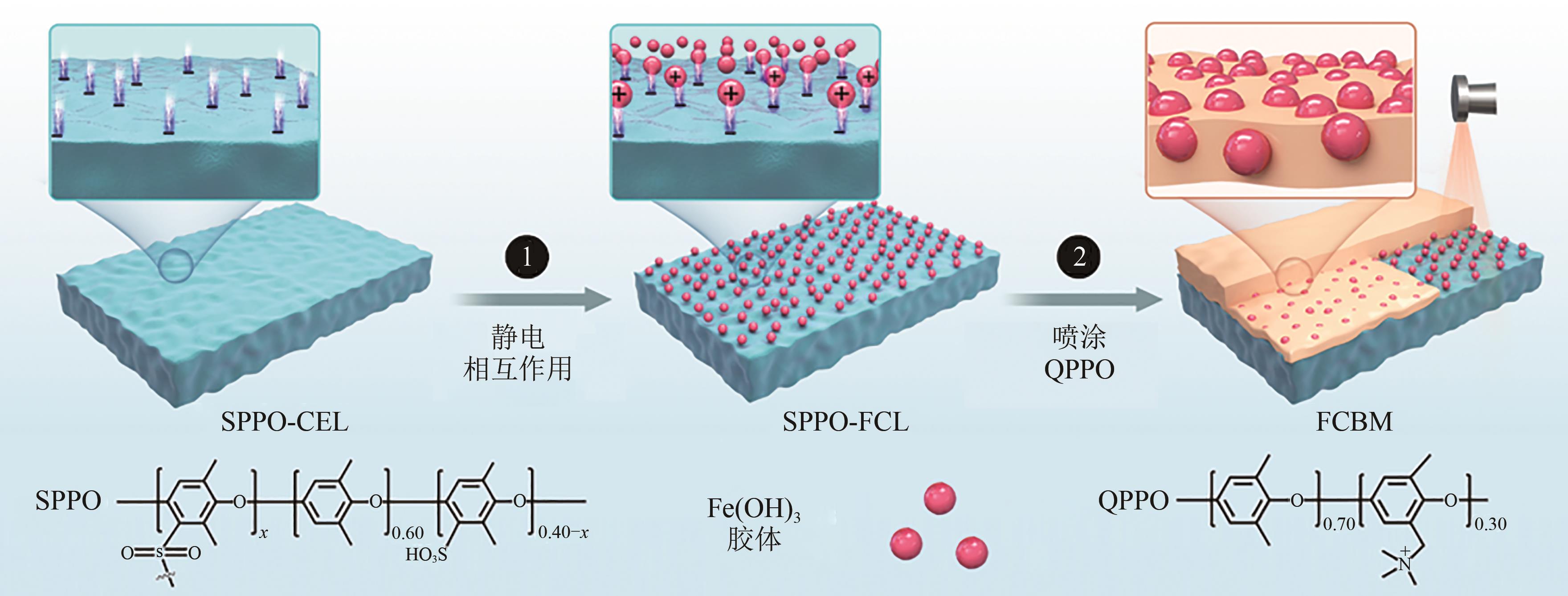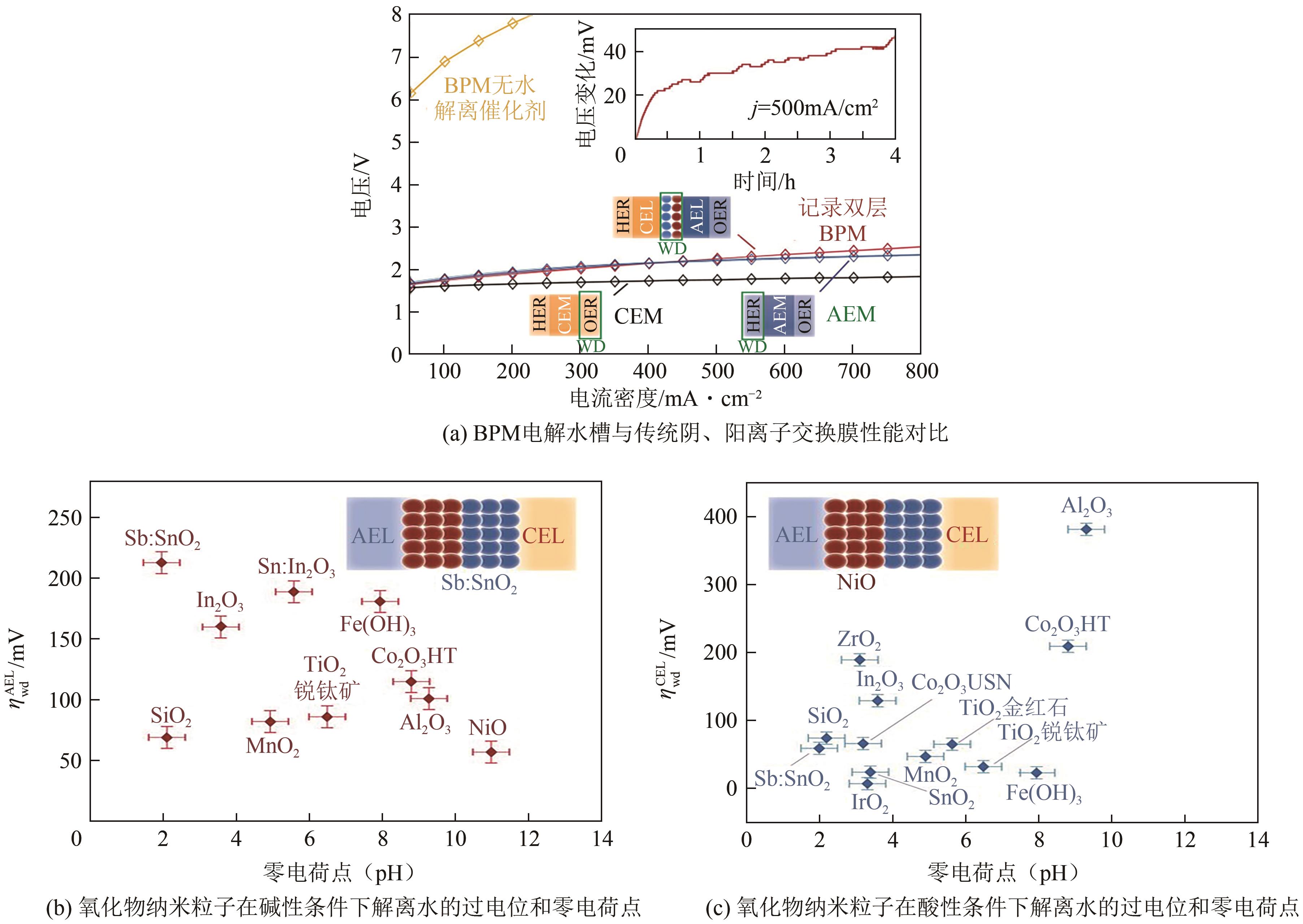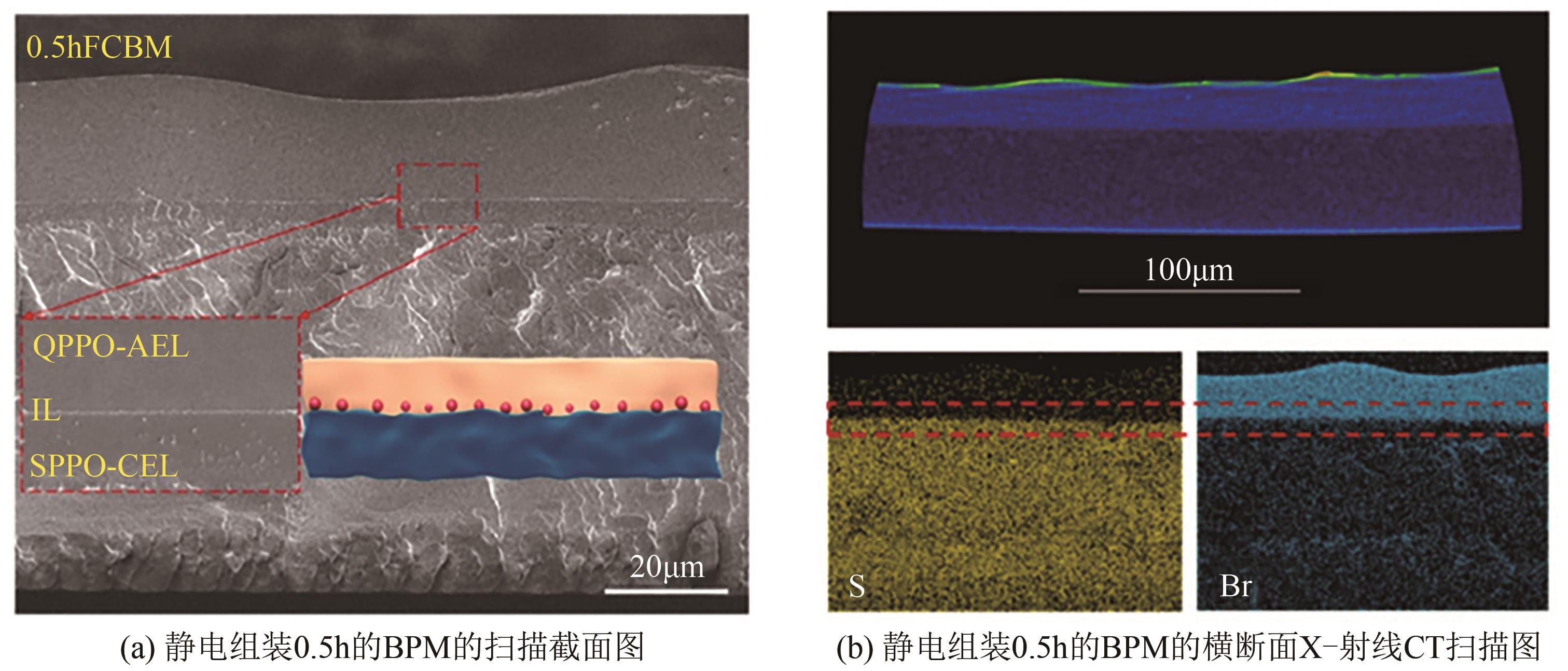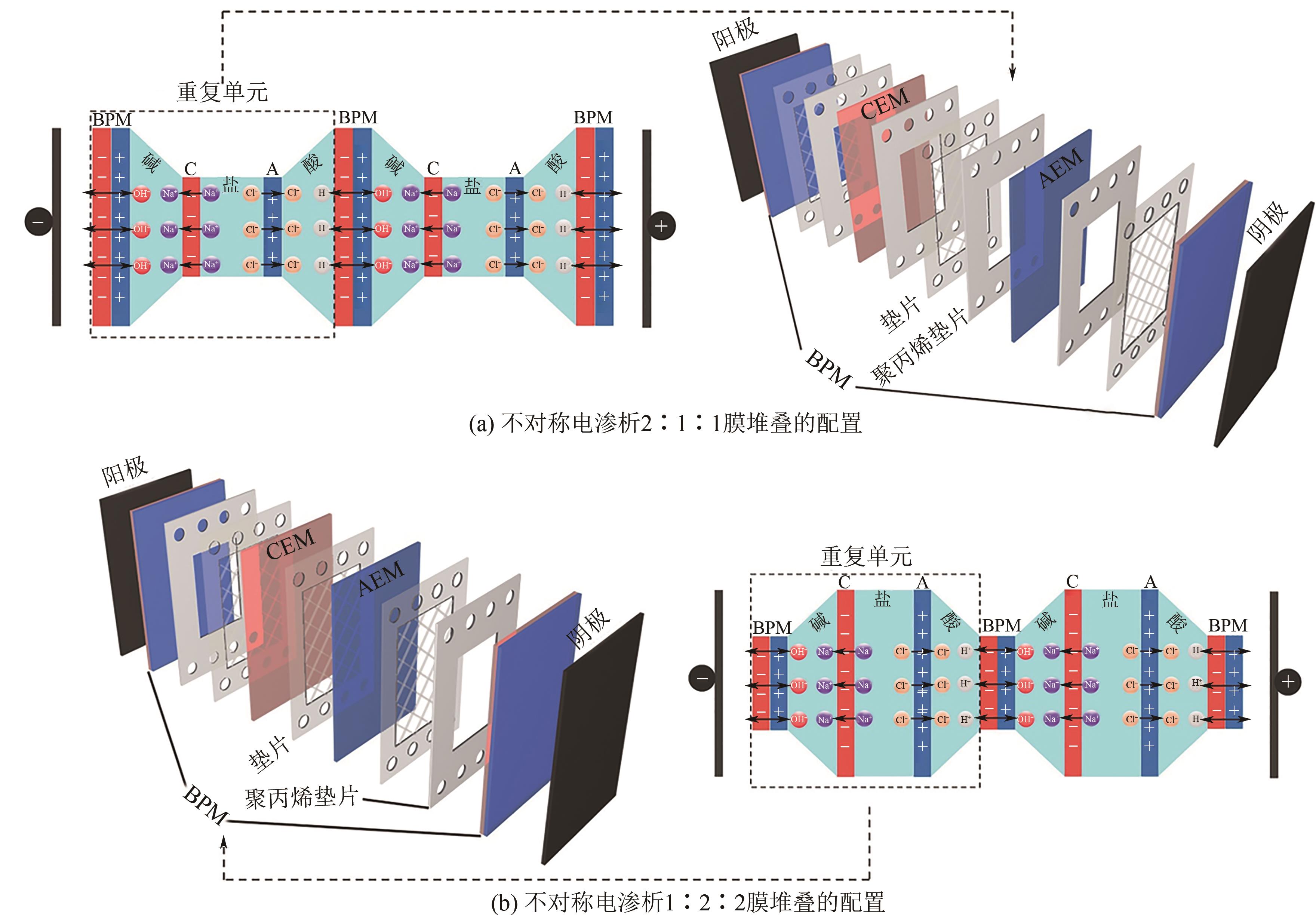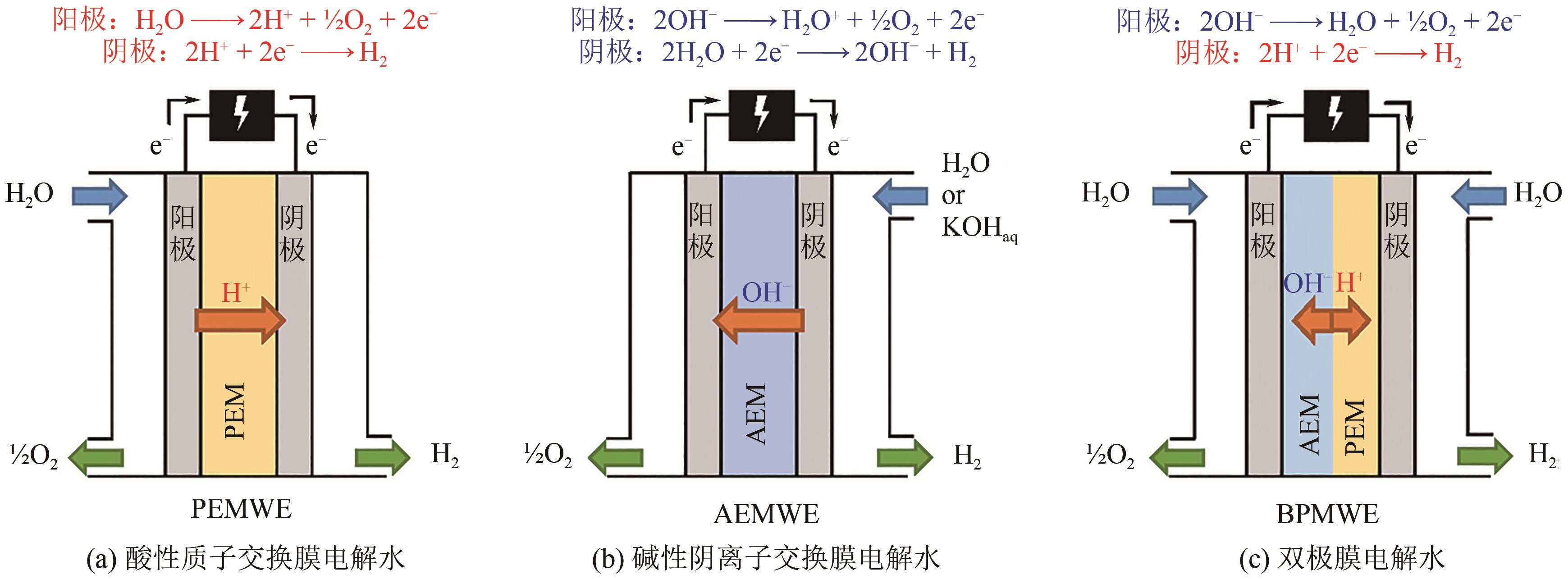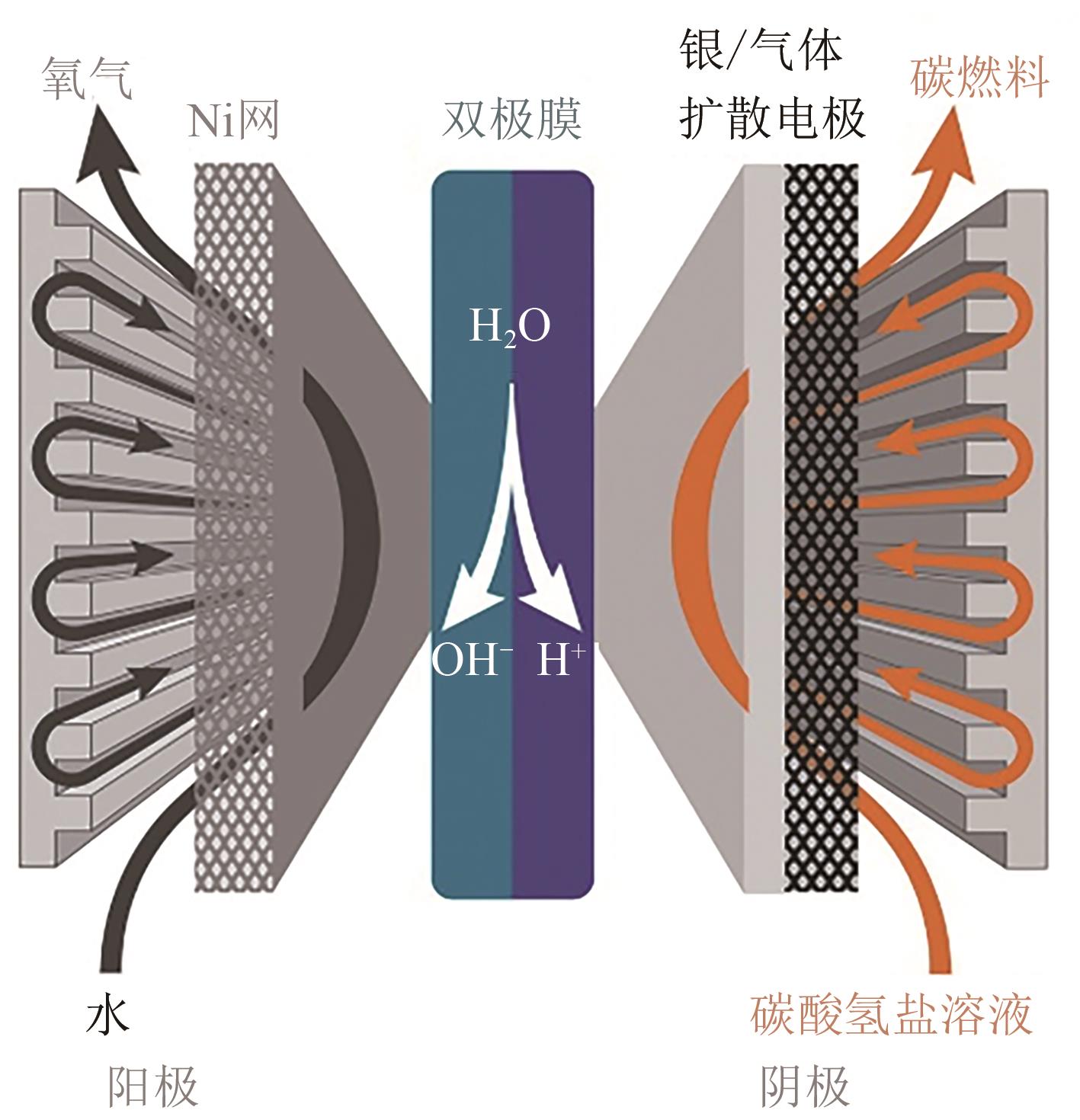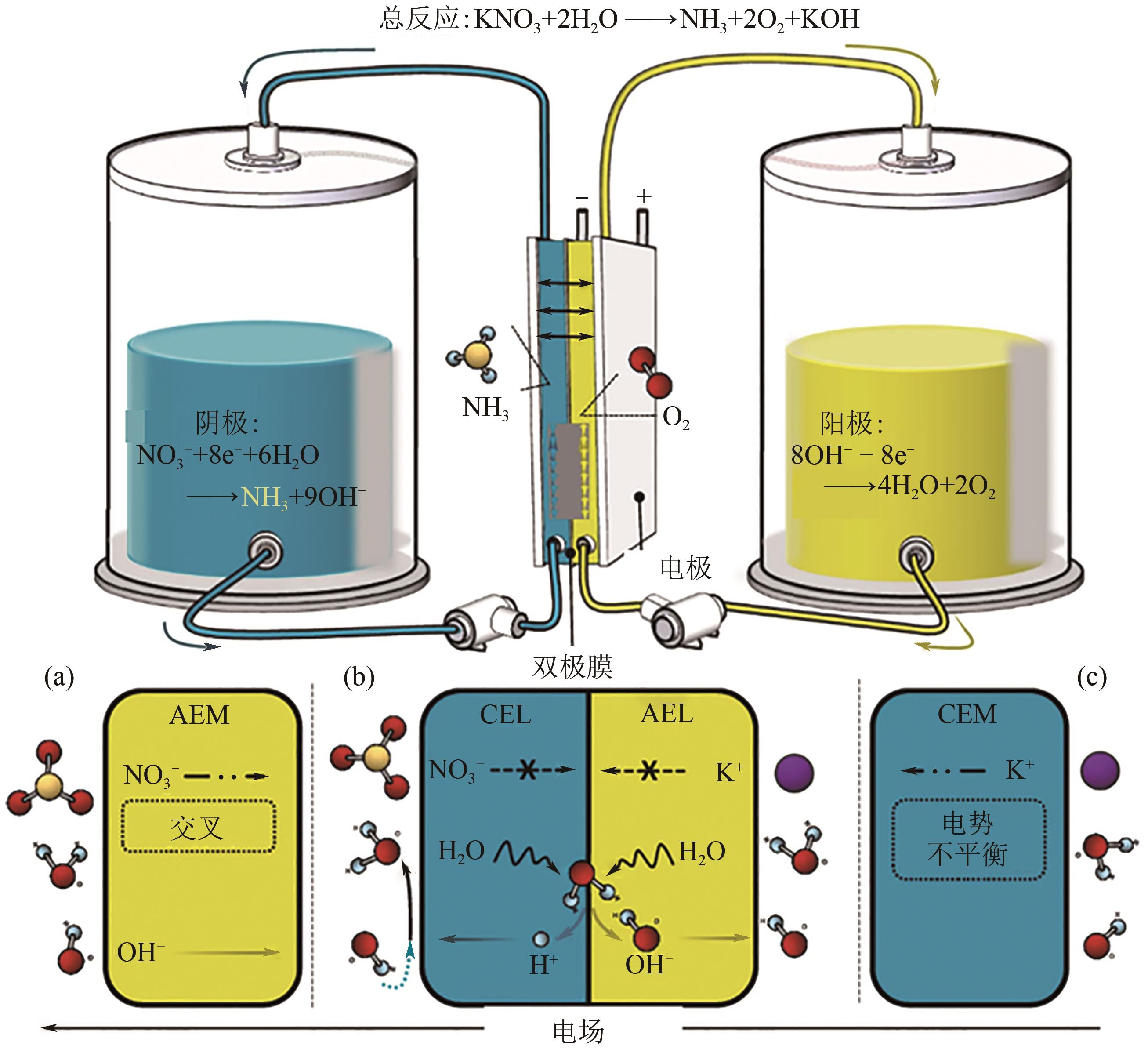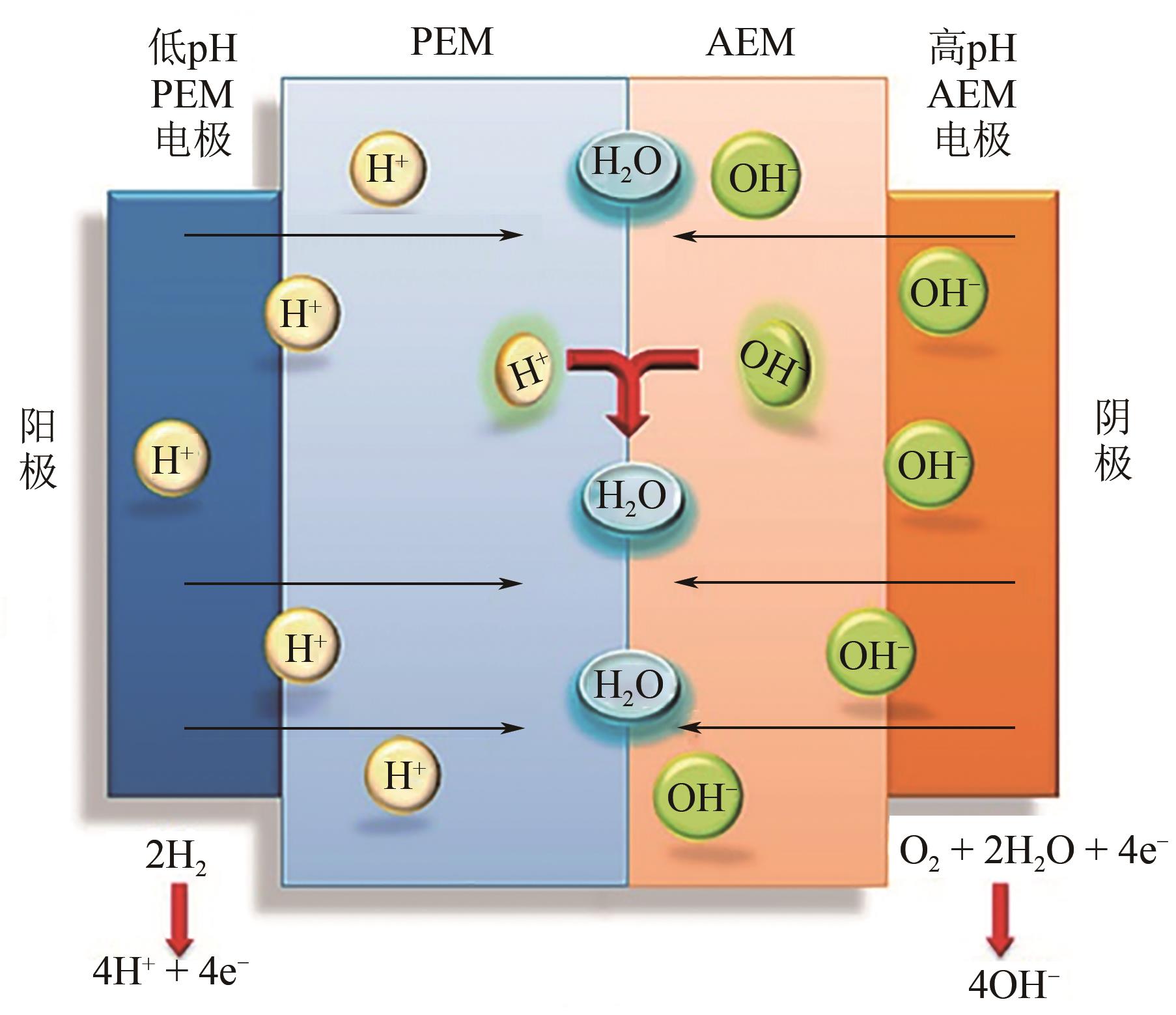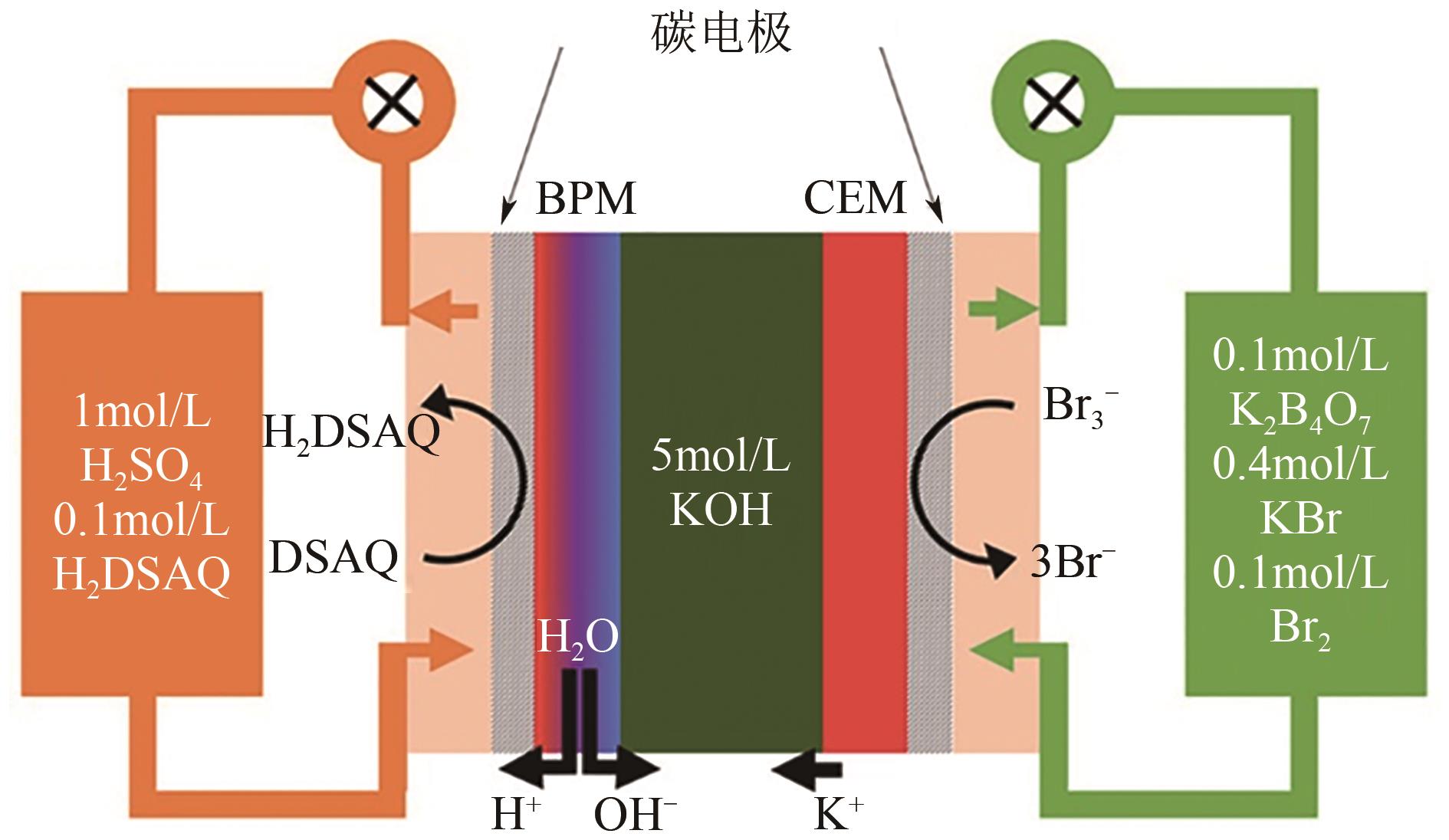Chemical Industry and Engineering Progress ›› 2024, Vol. 43 ›› Issue (1): 145-163.DOI: 10.16085/j.issn.1000-6613.2023-1260
• Column: Chemical process intensification • Previous Articles
Recent advances in the bipolar membrane and its applications
LUO Fen( ), YANG Xiaoqi, DUAN Fanglin, LI Xiaojiang, WU Liang(
), YANG Xiaoqi, DUAN Fanglin, LI Xiaojiang, WU Liang( ), XU Tongwen(
), XU Tongwen( )
)
- School of Chemistry and Materials Science, University of Science and Technology of China, Hefei 230026, Anhui, China
-
Received:2023-07-21Revised:2023-09-28Online:2024-02-05Published:2024-01-20 -
Contact:WU Liang, XU Tongwen
双极膜研究进展及应用展望
罗芬( ), 杨晓琪, 段方麟, 李小江, 吴亮(
), 杨晓琪, 段方麟, 李小江, 吴亮( ), 徐铜文(
), 徐铜文( )
)
- 中国科学技术大学化学与材料科学学院,安徽 合肥 230026
-
通讯作者:吴亮,徐铜文 -
作者简介:罗芬(1998—),女,博士研究生,研究方向为双极膜的制备与应用。E-mail:lfjy@mail.ustc.edu.cn。 -
基金资助:国家自然科学基金(22038013)
CLC Number:
Cite this article
LUO Fen, YANG Xiaoqi, DUAN Fanglin, LI Xiaojiang, WU Liang, XU Tongwen. Recent advances in the bipolar membrane and its applications[J]. Chemical Industry and Engineering Progress, 2024, 43(1): 145-163.
罗芬, 杨晓琪, 段方麟, 李小江, 吴亮, 徐铜文. 双极膜研究进展及应用展望[J]. 化工进展, 2024, 43(1): 145-163.
share this article
Add to citation manager EndNote|Ris|BibTeX
URL: https://hgjz.cip.com.cn/EN/10.16085/j.issn.1000-6613.2023-1260
| 催化剂分类 | 代表性催化剂 |
|---|---|
| 大分子物质催化剂 | 弱酸型:羧酸基[ 弱碱型:胺基[ 枝状大分子:PAMAM[ |
| 金属/金属配合物催化剂 | 金属盐:FeCl3[ 金属配合物:Fe(Ⅲ)@PEI[ |
| 金属氧化物 /氢氧化物催化剂 | 金属氧化物:TiO2[ 金属氢氧化物:Mg(OH)2[ |
| 金属有机框架(MOFs)催化剂 | Fe-MIL-101-NH2[ |
| 新型催化剂 | GO[ |
| 催化剂分类 | 代表性催化剂 |
|---|---|
| 大分子物质催化剂 | 弱酸型:羧酸基[ 弱碱型:胺基[ 枝状大分子:PAMAM[ |
| 金属/金属配合物催化剂 | 金属盐:FeCl3[ 金属配合物:Fe(Ⅲ)@PEI[ |
| 金属氧化物 /氢氧化物催化剂 | 金属氧化物:TiO2[ 金属氢氧化物:Mg(OH)2[ |
| 金属有机框架(MOFs)催化剂 | Fe-MIL-101-NH2[ |
| 新型催化剂 | GO[ |
| 71 | ABOU-DIAB M, THIBODEAU J, FLISS I, et al. Eco-circular production of demineralized bioactive peptides from bovine hemoglobin by performing the necessary steps simultaneously using bipolar membrane electrodialysis[J]. ACS Sustainable Chemistry & Engineering, 2021, 9(50): 16905-16917. |
| 72 | VERA E, SANDEAUX J, PERSIN F, et al. Deacidification of passion fruit juice by electrodialysis with bipolar membrane after different pretreatments[J]. Journal of Food Engineering, 2009, 90(1): 67-73. |
| 73 | WANG Yaoming, ZHANG Ni, HUANG Chuanhui, et al. Production of monoprotic, diprotic, and triprotic organic acids by using electrodialysis with bipolar membranes: Effect of cell configurations[J]. Journal of Membrane Science, 2011, 385/386: 226-233. |
| 74 | CHEN Riyao, HUANG Zhenxia, ZHENG Xi, et al. Paired electro-generation of glyoxylic acid using bipolar membrane made from sodium alginate and chitosan[J]. Chemical Engineering Communications, 2010, 197(12): 1476-1484. |
| 75 | YUAN Xiaole, LIU Jia, HAN Chunjiang, et al. Simultaneous nutrient-energy recovery from source-separated urine based on bioelectrically enhanced bipolar membrane-driven in situ alkali production coupling with gas-permeable membrane system[J]. Chemical Engineering Journal, 2022, 431: 134161. |
| 76 | ALVES DE OLIVEIRA R, SCHNEIDER R, HOSS LUNELLI B, et al. A simple biorefinery concept to produce 2G-lactic acid from sugar beet pulp (SBP): A high-value target approach to valorize a waste stream[J]. Molecules, 2020, 25(9): 2113. |
| 77 | LIU Guangli, LUO Haiping, WANG Haohao, et al. Malic acid production using a biological electrodialysis with bipolar membrane[J]. Journal of Membrane Science, 2014, 471: 179-184. |
| 78 | FU Rong, WANG Huangying, YAN Junying, et al. Asymmetric bipolar membrane electrodialysis for acid and base production[J]. AIChE Journal, 2023, 69(3): e17957. |
| 79 | GRIMAUD A. Acidic or basic oxides? Better together[J]. Joule, 2020, 4(11): 2251-2253. |
| 80 | KIM Byung Su, PARK Seul Chan, KIM Do-Hyeong, et al. Bipolar membranes to promote formation of tight ice-like water for efficient and sustainable water splitting[J]. Small, 2020, 16(41): 2002641. |
| 81 | MARIN D H, PERRYMAN J T, HUBERT M A, et al. Hydrogen production with seawater-resilient bipolar membrane electrolyzers[J]. Joule, 2023, 7(4): 765-781. |
| 82 | VERMAAS D A, SMITH W A. Synergistic electrochemical CO2 reduction and water oxidation with a bipolar membrane[J]. ACS Energy Letters, 2016, 1(6): 1143-1148. |
| 83 | CHEN Gaofeng, YUAN Yifei, JIANG Haifeng, et al. Electrochemical reduction of nitrate to ammonia via direct eight-electron transfer using a copper-molecular solid catalyst[J]. Nature Energy, 2020, 5(8): 605-613. |
| 84 | LAZOUSKI N, CHUNG M, WILLIAMS K, et al. Non-aqueous gas diffusion electrodes for rapid ammonia synthesis from nitrogen and water-splitting-derived hydrogen[J]. Nature Catalysis, 2020, 3(5): 463-469. |
| 85 | ÜNLÜ M, ZHOU J, KOHL P A. Hybrid anion and proton exchange membrane fuel cells[J]. The Journal of Physical Chemistry C, 2009, 113(26): 11416-11423. |
| 1 | BLOMMAERT M A, AILI D, TUFA R A, et al. Insights and challenges for applying bipolar membranes in advanced electrochemical energy systems[J]. ACS Energy Letters, 2021, 6(7): 2539-2548. |
| 2 | LUO Tao, ABDU S, WESSLING M. Selectivity of ion exchange membranes: A review[J]. Journal of Membrane Science, 2018, 555: 429-454. |
| 3 | FRILETTE V J. Preparation and characterization of bipolar ion exchange membranes[J]. The Journal of Physical Chemistry, 1956, 60(4): 435-439. |
| 4 | LOVRECEK B, DESPIC A, BOCKRIS J O M. Electrolytic junctions with rectifying properties[J]. The Journal of Physical Chemistry, 1959, 63(5): 750-751. |
| 5 | LOVREČEK B, KUNST B. Electrolytic junction with amplifying properties[J]. Nature, 1961, 189(4767): 804-806. |
| 6 | A. J. B. 肯佩曼. 双极膜技术手册[M]. 徐铜文, 傅荣强, 译. 北京: 化学工业出版社, 2004: 231. |
| KEMPERMAN A J B. Handbook on bipolar membrane technology[M]. XU Tongwen, FU Rongqiang, trans. Beijing: Chemical Industry Press, 2004: 231. | |
| 7 | PÄRNAMÄE R, MAREEV S, NIKONENKO V, et al. Bipolar membranes: A review on principles, latest developments, and applications[J]. Journal of Membrane Science, 2021, 617: 118538. |
| 8 | WANG Yaoming, HUANG Chuanhui, XU Tongwen. Which is more competitive for production of organic acids, ion-exchange or electrodialysis with bipolar membranes?[J]. Journal of Membrane Science, 2011, 374(1/2): 150-156. |
| 9 | SIMONS R. Water splitting in ion exchange membranes[J]. Electrochimica Acta, 1985, 30(3): 275-282. |
| 10 | KAISER V, BRAMWELL S T, HOLDSWORTH P C W, et al. Onsager's Wien effect on a lattice[J]. Nature Materials, 2013, 12(11): 1033-1037. |
| 11 | VERMAAS D A, SASSENBURG M, SMITH W A. Photo-assisted water splitting with bipolar membrane induced pH gradients for practical solar fuel devices[J]. Journal of Materials Chemistry A, 2015, 3(38): 19556-19562. |
| 12 | LI Yuguang C, ZHOU Dekai, YAN Zhifei, et al. Electrolysis of CO2 to syngas in bipolar membrane-based electrochemical cells[J]. ACS Energy Letters, 2016, 1(6): 1149-1153. |
| 13 | ÜNLÜ M, ZHOU J, KOHL P A. Hybrid polymer electrolyte fuel cells: Alkaline electrodes with proton conducting membrane[J]. Angewandte Chemie International Edition, 2010, 49(7): 1299-1301. |
| 14 | XIA Jiabing, EIGENBERGER G, STRATHMANN H, et al. Flow battery based on reverse electrodialysis with bipolar membranes: Single cell experiments[J]. Journal of Membrane Science, 2018, 565: 157-168. |
| 15 | XU Ziang, WAN Lei, LIAO Yiwen, et al. Continuous ammonia electrosynthesis using physically interlocked bipolar membrane at 1000 mA·cm-2 [J]. Nature Communications, 2023, 14: 1619. |
| 16 | BALSTER J, SRINKANTHARAJAH S, SUMBHARAJU R, et al. Tailoring the interface layer of the bipolar membrane[J]. Journal of Membrane Science, 2010, 365(1/2): 389-398. |
| 17 | LI Geng, SHEHZAD M A, GE Zijuan, et al. In-situ grown polyaniline catalytic interfacial layer improves water dissociation in bipolar membranes[J]. Separation and Purification Technology, 2021, 275: 119167. |
| 18 | GE Zijuan, SHEHZAD M A, YANG Xiaoqi, et al. High-performance bipolar membrane for electrochemical water electrolysis[J]. Journal of Membrane Science, 2022, 656: 120660. |
| 19 | MEL'NIKOV S S, SHAPOVALOVA O V, SHEL'DESHOV N V, et al. Effect of d-metal hydroxides on water dissociation in bipolar membranes[J]. Petroleum Chemistry, 2011, 51(7): 577-584. |
| 20 | CHEN Lihaokun, XU Qiucheng, OENER S Z, et al. Design principles for water dissociation catalysts in high-performance bipolar membranes[J]. Nature Communications, 2022, 13: 3846. |
| 21 | RUBINSTEIN I. A diffusional model of "water splitting" in electrodialysis[J]. The Journal of Physical Chemistry, 1977, 81(14): 1431-1436. |
| 22 | SIMONS R. Electric field effects on proton transfer between ionizable groups and water in ion exchange membranes[J]. Electrochimica Acta, 1984, 29(2): 151-158. |
| 23 | GIESBRECHT P K, FREUND M S. Recent advances in bipolar membrane design and applications[J]. Chemistry of Materials, 2020, 32(19): 8060-8090. |
| 24 | WIEN M. On the validity of Ohm's laws for electrolytes in very high field forces[J]. Annalen Der Physik, 1924, 73(3/4): 161-181. |
| 25 | ONSAGER L. Deviations from Ohm's law in weak electrolytes[J]. The Journal of Chemical Physics, 1934, 2(9): 599-615. |
| 26 | ZABOLOTSKII V I, GANYCH V V, SHELDESHOV N V. Effect of copper-complexes with the ionogenic groups of the MA-40 anion-exchange membrane on the dissociation rate of water-molecules in the electric-field[J]. Soviet Electrochemistry, 1991, 27(10): 1098-1102. |
| 27 | STRATHMANN H, KROL J J, H-J RAPP, et al. Limiting Current density and water dissociation in bipolar membranes[J]. Journal of Membrane Science, 1997, 125(1): 123-142. |
| 28 | SIMONS R. Strong electric field effects on proton transfer between membrane-bound amines and water[J]. Nature, 1979, 280(5725): 824-826. |
| 29 | GREBEN V P, PIVOVAROV N Y, KOVARSKII N Y, et al. Influence of ionite nature on physicochemical properties of bipolar ion-exchange membranes[J]. Zhurnal Fiz Khimii, 1978, 52(10): 2641-2645. |
| 30 | XUE Yanhong, XU Tongwen, FU Rongqiang, et al. Catalytic water dissociation using hyperbranched aliphatic polyester (Boltorn® series) as the interface of a bipolar membrane[J]. Journal of Colloid and Interface Science, 2007, 316(2): 604-611. |
| 31 | ABDU S, SRICHAROEN K, WONG J E, et al. Catalytic polyelectrolyte multilayers at the bipolar membrane interface[J]. ACS Applied Materials & Interfaces, 2013, 5(21): 10445-10455. |
| 32 | ALCARAZ A, RAMÍ́REZ P, MAFÉ S, et al. Ion selectivity and water dissociation in polymer bipolar membranes studied by membrane potential and current-voltage measurements[J]. Polymer, 2000, 41(17): 6627-6634. |
| 33 | STRATHMANN H, H-J RAPP, BAUER B, et al. Theoretical and practical aspects of preparing bipolar membranes[J]. Desalination, 1993, 90(1/2/3): 303-323. |
| 34 | FU Rongqiang, XU Tongwen, CHENG Yiyun, et al. Fundamental studies on the intermediate layer of a bipolar membrane: Part Ⅲ. Effect of starburst dendrimer PAMAM on water dissociation at the interface of a bipolar membrane[J]. Journal of Membrane Science, 2004, 240: 141-147. |
| 35 | ZABOLOTSKY V, UTIN S, BESPALOV A, et al. Modification of asymmetric bipolar membranes by functionalized hyperbranched polymers and their investigation during pH correction of diluted electrolytes solutions by electrodialysis[J]. Journal of Membrane Science, 2015, 494: 188-195. |
| 36 | GE Zijuan, SHEHZAD M A, GE Liang, et al. Beneficial use of a coordination complex as the junction catalyst in a bipolar membrane[J]. ACS Applied Energy Materials, 2020, 3(6): 5765-5773. |
| 37 | FU Rongqiang, CHENG Yiyun, XU Tongwen, et al. Fundamental studies on the intermediate layer of a bipolar membrane. Part Ⅵ. Effect of the coordinated complex between starburst dendrimer PAMAM and chromium (Ⅲ) on water dissociation at the interface of a bipolar membrane[J]. Desalination, 2006, 196(1/2/3): 260-265. |
| 38 | OENER S Z, FOSTER M J, BOETTCHER S W. Accelerating water dissociation in bipolar membranes and for electrocatalysis[J]. Science, 2020, 369(6507): 1099-1103. |
| 39 | ODA Y, YAWATAYA T. Neutrality-disturbance phenomenon of membrane-solution systems[J]. Desalination, 1968, 5(2): 129-138. |
| 40 | WANG Qiuyue, WU Bin, JIANG Chenxiao, et al. Improving the water dissociation efficiency in a bipolar membrane with amino-functionalized MIL-101[J]. Journal of Membrane Science, 2017, 524: 370-376. |
| 41 | MCDONALD M B, FREUND M S. Graphene oxide as a water dissociation catalyst in the bipolar membrane interfacial layer[J]. ACS Applied Materials & Interfaces, 2014, 6(16): 13790-13797. |
| 42 | CHEN Yingying, WRUBEL J A, KLEIN W E, et al. High-performance bipolar membrane development for improved water dissociation[J]. ACS Applied Polymer Materials, 2020, 2(11): 4559-4569. |
| 43 | LIU Yaoxing, CHEN Jiahui, CHEN Riyao, et al. Effects of multi-walled carbon nanotubes on bipolar membrane properties[J]. Materials Chemistry and Physics, 2018, 203: 259-265. |
| 44 | BHOWMICK S, QURESHI M. Vanadium oxide nanosheet-infused functionalized polysulfone bipolar membrane for an efficient water dissociation reaction[J]. ACS Applied Materials & Interfaces, 2023, 15(4): 5466-5477. |
| 45 | AMORIM I, XU Junuyan, ZHANG Nan, et al. Dual-phase CoP-CoTe2 nanowires as an efficient bifunctional electrocatalyst for bipolar membrane-assisted acid-alkaline water splitting[J]. Chemical Engineering Journal, 2021, 420: 130454. |
| 46 | MARTÍNEZ R J, FARRELL J. Water splitting activity of oxygen-containing groups in graphene oxide catalyst in bipolar membranes[J]. Computational and Theoretical Chemistry, 2019, 1164: 112556. |
| 47 | ZHU Wen, WANG Haizhi, JING Guoshan, et al. Rapid spray-crosslinked assembly of a stable high-performance polyelectrolyte bipolar membrane[J]. RSC Advances, 2017, 7(58): 36313-36318. |
| 48 | XUE Yanhong, FU Rongqiang, FU Yanxun, et al. Fundamental studies on the intermediate layer of a bipolar membrane: Ⅴ. Effect of silver halide and its dope in gelatin on water dissociation at the interface of a bipolar membrane[J]. Journal of Colloid and Interface Science, 2006, 298(1): 313-320. |
| 49 | SIMONS R. A novel method for preparing bipolar membranes[J]. Electrochimica Acta, 1986, 31(9): 1175-1177. |
| 50 | 李耕. 原位生长法制备双极膜中间层[D]. 合肥: 中国科学技术大学, 2021. |
| LI Geng. Preparing interfacial layer of bipolar membrane with in-situ growth method[D]. Hefei: University of Science and Technology of China, 2021. | |
| 51 | SHEHZAD M A, YASMIN A, GE X, et al. Shielded goethite catalyst that enables fast water dissociation in bipolar membranes[J]. Nature Communications, 2021, 12: 9. |
| 52 | 葛紫娟. 双极膜界面调控及电化学应用研究[D]. 合肥: 中国科学技术大学, 2022. |
| GE Zijuan. Bipolar membrane interfacial modification and electrochemical applications[D]. Hefei: University of Science and Technology of China, 2022. | |
| 53 | 杨晓琪. 双极膜水解离催化层构筑与性能调控[D]. 合肥: 中国科学技术大学, 2023. |
| YANG Xiaoqi. Precisely modify the interface layer and improve water dissociation property of bipolar membrane[D]. Hefei: University of Science and Technology of China, 2023. | |
| 54 | SIMONS R. Preparation of a high performance bipolar membrane[J]. Journal of Membrane Science, 1993, 78(1/2): 13-23 |
| 55 | CHABI S, WRIGHT A G, HOLDCROFT S, et al. Transparent bipolar membrane for water splitting applications[J]. ACS Applied Materials & Interfaces, 2017, 9(32): 26749-26755. |
| 56 | JEEVANANDA T, YEON Kyeong-Ho, MOON Seung-Hyeon. Synthesis and characterization of bipolar membrane using pyridine functionalized anion exchange layer[J]. Journal of Membrane Science, 2006, 283(1/2): 201-208. |
| 57 | BHADJA V, SHARMA S, KULSHRESTHA V, et al. Preparation of heterogeneous bipolar membranes and their performance evaluation for the regeneration of acid and alkali[J]. RSC Advances, 2015, 5(71): 57632-57639. |
| 58 | 刘颖, 王建友. 双极膜制备及改性研究进展[J]. 化工进展, 2016, 35(1): 157-165. |
| LIU Ying, WANG Jianyou. Progress on preparation and modification of bipolar membrane[J]. Chemical Industry and Engineering Progress, 2016, 35(1): 157-165. | |
| 59 | PAN Jiefeng, HOU Linxiao, WANG Qiuyue, et al. Preparation of bipolar membranes by electrospinning[J]. Materials Chemistry and Physics, 2017, 186: 484-491. |
| 60 | SHEN Chunhui, WYCISK R, PINTAURO P N. High performance electrospun bipolar membrane with a 3D junction[J]. Energy & Environmental Science, 2017, 10(6): 1435-1442. |
| 61 | PARK E J, ARGES C G, XU Hui, et al. Membrane strategies for water electrolysis[J]. ACS Energy Letters, 2022, 7(10): 3447-3457. |
| 62 | LEE L, KIM D. Poly(arylene ether ketone)-based bipolar membranes for acid-alkaline water electrolysis applications[J]. Journal of Materials Chemistry A, 2021, 9(9): 5485-5496. |
| 63 | SIRITANARATKUL B, FORSTER M, GREENWELL F, et al. Zero-gap bipolar membrane electrolyzer for carbon dioxide reduction using acid-tolerant molecular electrocatalysts[J]. Journal of the American Chemical Society, 2022, 144(17): 7551-7556. |
| 64 | LI Tengfei, LEES E W, GOLDMAN M, et al. Electrolytic conversion of bicarbonate into CO in a flow cell[J]. Joule, 2019, 3(6): 1487-1497. |
| 65 | PENG Sikan, XU Xin, LU Shanfu, et al. A self-humidifying acidic-alkaline bipolar membrane fuel cell[J]. Journal of Power Sources, 2015, 299: 273-279. |
| 66 | AHLFIELD J M, LIU L, KOHL P A. PEM/AEM junction design for bipolar membrane fuel cells[J]. Journal of the Electrochemical Society, 2017, 164(12): F1165-F1171. |
| 67 | LOKTIONOV P, KONEV D, ANTIPOV A. Hydrogen-assisted neutralization flow battery with high power and energy densities[J]. Journal of Power Sources, 2023, 564: 232818. |
| 68 | METLAY A S, CHYI B, YOON Y, et al. Three-chamber design for aqueous acid-base redox flow batteries[J]. ACS Energy Letters, 2022, 7(3): 908-913. |
| 69 | LEI Chunxiao, LI Zichao, GAO Qi, et al. Comparative study on the production of gluconic acid by electrodialysis and bipolar membrane electrodialysis: Effects of cell configurations[J]. Journal of Membrane Science, 2020, 608: 118192. |
| 70 | RÓZSENBERSZKI T, KOMÁROMY P, HÜLBER-BEYER É, et al. Demonstration of bipolar membrane electrodialysis technique for itaconic acid recovery from real fermentation effluent of Aspergillus terreus [J]. Chemical Engineering Research and Design, 2021, 175: 348-357. |
| [1] | WANG Darui, SUN Hongmin, WANG Yiyan, TANG Zhimou, LI Rui, FAN Xueyan, YANG Weimin. Recent progress in zeolite for efficient catalytic reaction process [J]. Chemical Industry and Engineering Progress, 2024, 43(1): 1-18. |
| [2] | ZHANG Mingyan, LIU Yan, ZHANG Xueting, LIU Yake, LI Congju, ZHANG Xiuling. Research progress of non-noble metal bifunctional catalysts in zinc-air batteries [J]. Chemical Industry and Engineering Progress, 2023, 42(S1): 276-286. |
| [3] | SHI Yongxing, LIN Gang, SUN Xiaohang, JIANG Weigeng, QIAO Dawei, YAN Binhang. Research progress on active sites in Cu-based catalysts for CO2 hydrogenation to methanol [J]. Chemical Industry and Engineering Progress, 2023, 42(S1): 287-298. |
| [4] | XIE Luyao, CHEN Songzhe, WANG Laijun, ZHANG Ping. Platinum-based catalysts for SO2 depolarized electrolysis [J]. Chemical Industry and Engineering Progress, 2023, 42(S1): 299-309. |
| [5] | YANG Xiazhen, PENG Yifan, LIU Huazhang, HUO Chao. Regulation of active phase of fused iron catalyst and its catalytic performance of Fischer-Tropsch synthesis [J]. Chemical Industry and Engineering Progress, 2023, 42(S1): 310-318. |
| [6] | WANG Lele, YANG Wanrong, YAO Yan, LIU Tao, HE Chuan, LIU Xiao, SU Sheng, KONG Fanhai, ZHU Canghai, XIANG Jun. Influence of spent SCR catalyst blending on the characteristics and deNO x performance for new SCR catalyst [J]. Chemical Industry and Engineering Progress, 2023, 42(S1): 489-497. |
| [7] | DENG Liping, SHI Haoyu, LIU Xiaolong, CHEN Yaoji, YAN Jingying. Non-noble metal modified vanadium titanium-based catalyst for NH3-SCR denitrification simultaneous control VOCs [J]. Chemical Industry and Engineering Progress, 2023, 42(S1): 542-548. |
| [8] | CHENG Tao, CUI Ruili, SONG Junnan, ZHANG Tianqi, ZHANG Yunhe, LIANG Shijie, PU Shi. Analysis of impurity deposition and pressure drop increase mechanisms in residue hydrotreating unit [J]. Chemical Industry and Engineering Progress, 2023, 42(9): 4616-4627. |
| [9] | WANG Peng, SHI Huibing, ZHAO Deming, FENG Baolin, CHEN Qian, YANG Da. Recent advances on transition metal catalyzed carbonylation of chlorinated compounds [J]. Chemical Industry and Engineering Progress, 2023, 42(9): 4649-4666. |
| [10] | ZHANG Qi, ZHAO Hong, RONG Junfeng. Research progress of anti-toxicity electrocatalysts for oxygen reduction reaction in PEMFC [J]. Chemical Industry and Engineering Progress, 2023, 42(9): 4677-4691. |
| [11] | GE Quanqian, XU Mai, LIANG Xian, WANG Fengwu. Research progress on the application of MOFs in photoelectrocatalysis [J]. Chemical Industry and Engineering Progress, 2023, 42(9): 4692-4705. |
| [12] | WANG Weitao, BAO Tingyu, JIANG Xulu, HE Zhenhong, WANG Kuan, YANG Yang, LIU Zhaotie. Oxidation of benzene to phenol over aldehyde-ketone resin based metal-free catalyst [J]. Chemical Industry and Engineering Progress, 2023, 42(9): 4706-4715. |
| [13] | GE Yafen, SUN Yu, XIAO Peng, LIU Qi, LIU Bo, SUN Chengying, GONG Yanjun. Research progress of zeolite for VOCs removal [J]. Chemical Industry and Engineering Progress, 2023, 42(9): 4716-4730. |
| [14] | XIANG Yang, HUANG Xun, WEI Zidong. Recent progresses in the activity and selectivity improvement of electrocatalytic organic synthesis [J]. Chemical Industry and Engineering Progress, 2023, 42(8): 4005-4014. |
| [15] | WANG Yaogang, HAN Zishan, GAO Jiachen, WANG Xinyu, LI Siqi, YANG Quanhong, WENG Zhe. Strategies for regulating product selectivity of copper-based catalysts in electrochemical CO2 reduction [J]. Chemical Industry and Engineering Progress, 2023, 42(8): 4043-4057. |
| Viewed | ||||||
|
Full text |
|
|||||
|
Abstract |
|
|||||
